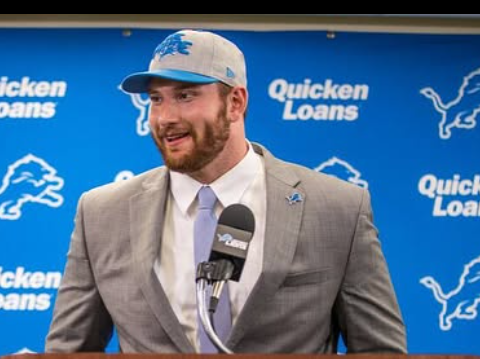With an estimated net worth of almost $79 million, Frank Ragnow is a glaring example of the unique combination of talent, timing, and foresight that characterizes modern NFL careers. From rookie-level contracts in 2018 to top-tier contracts that placed him among the highest-paid centers in the league, his financial trajectory was remarkably successful. Ragnow was one of the most obvious beneficiaries of the offensive line pay increase over the last ten years, obtaining an extension that took into account his dependability as well as his contribution to Detroit’s offensive comeback.

Ragnow was selected 20th overall in 2018 and started for the Lions right away, displaying the kind of incredibly dependable presence at center that coaches aspire to. His yearly average of $13.5 million put him in the top four at his position in the league, demonstrating Detroit’s high regard for his contributions. In addition to his salary, his net worth increased through disciplined investing and structured guarantees, two tactics that were very effective in protecting long-term wealth. NFL players have grown more astute in recent years, and Ragnow’s strategy for accumulating wealth was especially creative, emulating that of players like Quenton Nelson who have made the most of their influence in their prime.
Frank Ragnow – Profile
| Category | Details |
|---|---|
| Full Name | Frank Ragnow |
| Nationality | American |
| Occupation | Former NFL Player (Center) |
| Date of Birth | May 17, 1996 |
| Place of Birth | Victoria, Minnesota, USA |
| Height | 6 ft 5 in (1.96 m) |
| Weight | 311 lb (141 kg) |
| Net Worth | Estimated $78,734,930 |
| NFL Draft | 2018, Round 1, Pick 20 (Detroit Lions) |
| College | Arkansas Razorbacks |
| Pro Bowl Selections | 4 |
| All-Pro Selections | 3 (Second Team) |
| Retirement | Announced June 2, 2025 |
| Reference |
Ragnow’s career earnings by the time of his retirement in June 2025 were over $57 million, but his net worth was almost $22 million higher due to endorsements and careful management. Although his decision to retire at the age of 29 may seem sudden, it seems especially obvious given how harsh the game has become for linemen. It is a financial and personal choice that demonstrates remarkable foresight to decide to leave while still healthy rather than risk the decline that many linemen experience.
But Detroit was left in a bind. The Lions’ offensive line abruptly lost two anchors after veteran Kevin Zeitler left in free agency. At a time when expectations were extremely high, Ragnow’s departure left a hole that severely diminished the team’s stability. Losing such a key player was an especially upsetting blow to fans who had been building for a run to the Super Bowl. The Lions thought about testing rookie Miles Frazier and moving Graham Glasgow to center, but none of those options could match Ragnow’s leadership or extremely effective blocking right away.
His retirement had a significant impact on the cap as well. With cap hits of $14.05 million in 2025 and $16.35 million in 2026 for the final two years of his extension, the Lions now have flexibility but also the difficult task of filling a void. Ragnow had to forgo future profits in order to make the choice, but his foundation had been established and his wealth was already remarkably resilient. Even though it won’t grow as quickly as it did during his playing days, we can anticipate that his endorsements and investments will continue to increase that number in the years to come.
The wider cultural reflection that Ragnow’s story provides is what makes it so captivating. A new generation of players is putting life outside of football first, as evidenced by his retirement at 29, which echoes the shockwaves of Andrew Luck’s departure at the same age. Ragnow chose longevity and balance over making the most money possible from his career by retiring early. His choice was especially helpful in creating the impression that modern athletes have agency and can leave on their own terms without damaging their reputation.
Although it is painful for Detroit to lose a player who is so effective, Ragnow’s decision shows hope that players no longer have to forgo their health in order to play. His current net worth is more than just a sum of money; it represents the decisions made by a professional who prioritized future, family, and foresight over short-lived fame. He established a stable financial and personal legacy by forming strategic alliances with advisors and performing consistently on the field.
His farewell Instagram post reminded fans that every Pro Bowl selection and every contract figure is a human being who is considering their future, family, and health. It struck a deeply personal note. Ragnow’s approach has been modest, subtly establishing stability and demonstrating to younger athletes that money management can be just as significant as performance, in contrast to many athletes who engage in ostentatious displays of wealth. This viewpoint, which is very clear in his approach, is very effective in motivating the upcoming generation of NFL players to look beyond the field.
In retrospect, Ragnow’s choice appears remarkably cost-effective for his future self: he forewent decades of maintained health and financial independence in exchange for millions in potential earnings. In addition to being a figure, his $78 million net worth serves as a reminder of what can be accomplished with self-control and the guts to take a step back. His story is especially novel in a league where injuries and poor management frequently end careers, showing how athletes are redefining what success means.
